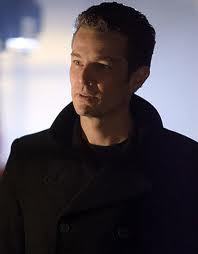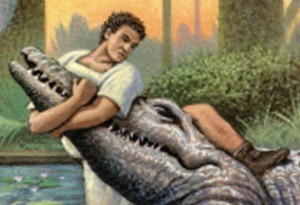This Week in Romanpunk: listening to Falco
 I finally bit the bullet last month and signed up for a trial membership to Audible. I still have yet to find an audiobook that matches the story-reader glory of Neil Gaiman's Anansi Boys read by Lenny Henry, but I learned two important things from my search: 1) the narrator really does matter, and 2) audio books are a good way to reread, a pleasurable activity that I have found no time for in my life at all since I was pregnant with my first child (ie more than six years ago, yipes).
I finally bit the bullet last month and signed up for a trial membership to Audible. I still have yet to find an audiobook that matches the story-reader glory of Neil Gaiman's Anansi Boys read by Lenny Henry, but I learned two important things from my search: 1) the narrator really does matter, and 2) audio books are a good way to reread, a pleasurable activity that I have found no time for in my life at all since I was pregnant with my first child (ie more than six years ago, yipes).
I've been flirting for years with the idea that I should read Jim Butcher, as one of the popular authors of urban fantasy, but never quite got up the incentive to do so. Until I discovered that his audiobooks are read by James Marsters. YEAH BABY. Sadly not James Marsters doing his dodgy British accent, but you can't have everything.
A joyous discovery in all my toothcombing of Audible's catalogues are not quite audiobooks, but full cast dramatisations (secretly I like these better than audio books) of the first five Falco books by Lindsey Davis. These used to be some of my favourite rereads, and revisiting them through such good close-to-the-text adaptations has been extremely happymaking. It's also getting my writing brain working towards the shape of my Nancy Napoleon books, and how much I want them to be influenced by (and pushing against) the traditions of detective fiction.
There are many things I love about the Falco books, especially the first five or so. They conjure up a vivid image of Ancient Rome as a real place people lived in – not a completely authentic version perhaps, with plenty of tongue-in-cheek postmodern jokes, and characters occasionally displaying a suspiciously 20th century attitude to issues like slavery and the (lack of) rights of women – but nevertheless a very convincing piece of scene setting, rich with historical detail, and solid under your feet. It gets so much more right than it gets wrong, and I particularly like the variety of freedoms, roles and power allowed to female characters. Anyone wondering how to address gender issues in fantasy novels based on historical periods without alienating the modern audience could learn a lot from these books.
Then there's the characters, the marvellous and memorable people of the stories. I love complicated families and right from the beginning we get two of them: Falco's sprawling tangle of sisters, bad husbands, grotty children and the tragicomic figures of his parents as well as the absent dead hero brother he can never live up to; and Helena Justina's stiffly formal aristocratic clan, perfect on the outside, and full of political traitors, flakes and disappointments once you peel back the layers. Lindsey Davis has a gift for snappy dialogue (my favourite thing in the world) and this makes the stories not only crackle as they dance between humour and grim situations, but also makes them perfect for radio adaptations such as these.
But the aspect of the Falco novels that's most clicking with my brain right now is the way that they desconstruct the hardboiled detective novel. Right from the opening page we get his voice, full of rich observational detail, wit and cynicism, introducing us to the mean streets of Rome and a pretty blonde girl in trouble. The first three books set up just about every detective novel archetype only to interrogate and puncture them, either with humour or with a reversal of expectations. We never, for instance, got to meet Philip Marlowe's mother, or spent much time wondering how Spenser paid the rent in the lean months. Falco comes with human baggage, a metric ton of it, and while he tries to play the smooth, ruthless investigator, no one ever lets him get away with that kind of self-importance.
So listening to these lovely plays, featuring Anton Lesser and Anna Maddeley as Falco and Helena, is constantly making me think about the choices I am making with Fury, my Nancy Napoleon novel. Urban fantasy is strongly influenced by hardboiled crime, and that was something I emphasised when selling the idea of it to the Australia Council. Looking at how this author has taken apart the tropes of detective fiction to make a modern, warm and bags-of-character story, and the various choices she has made (to dripfeed family history and baggage over several novels, for example) has my writerly brain buzzing, and I rather suspect I'm going to have to go back to the source and inhale some Raymond Chandler, Dashiell Hammett and other classic detective novelists. Just when I thought I was done with the whole crime thing, as a writer…
I don't suppose James Marsters narrates those, too?




